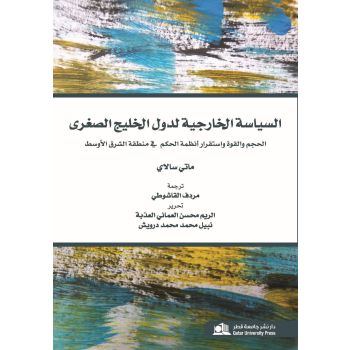السياسة الخارجية لدول الخليج الصغرىالحجم والقوة واستقرار أنظمة الحكم في منطقة الشرق الأوسط
يدرس هذا الكتاب كيفية تمكن دول الخليج الصغرى من زيادة حجم نفوذها في منطقة الشرق الأوسط؛ إذ إنها في كثير من الأحيان استفادت من صغر حجمها بوصفه أداة للسياسة الخارجية. وقد بينت هذه الدراسة، من خلال إنشاء إطار نظري جديد (نموذج الحجم المعقد)، طرقًا محددة يمكن أن يؤثر بها صغر الحجم المادي والإدراكي في القوة، والهوية، واستقرار نظام الحكم، والنفوذ في السياسة الدولية.
وخلال العقد الماضي، تمكنت دول الخليج الصغرى (البحرين والكويت وعمان وقطر والإمارات) من تعزيز نفوذها في السياسة الإقليمية بشكل كبير، رغم أن حجمها لا يزال يعتبر نقطة ضعف أساسية يصعب حلها، مما يجعلها جهات فاعلة ثانوية بعد القوى الكبرى، مثل السعودية وإيران. ومن خلال تفكيك التحالفات الصريحة والضمنية مع الدول الكبرى، يعرض الكتاب دراسات حالة محددة تتعلق بالسلوك المتبع تجاه السياسة الخارجية والأمنية، بما في ذلك حروب الخليج، والثورات العربية، والأزمة الخليجية، واتفاقات أبراهام.
وعند تحليل دول الخليج الصغرى، التي غالبًا ما تُهمَل، نجد أن الحجم يشكل إسهامات مهمة في نظرية العلاقات الدولية، مما يجعله مصدرًا رئيسًا للطلاب والأكاديميين المهتمين بدراسات الدول الصغرى، ودراسات الخليج، والعلوم السياسية في الشرق الأوسط.
This book studies how smaller Gulf states managed to increase their influence in the Middle East, oftentimes capitalising on their smallness as a foreign policy tool. By establishing a novel theoretical framework (the complex model of size), this study identifies specific ways in which material and perceptual smallness affect power, identity, regime stability, and leverage in international politics.
The small states of the Gulf (Bahrain, Kuwait, Oman, Qatar, and the United Arab Emirates) managed to build up considerable influence in regional politics over the last decade, although their size is still considered an essential, irresolvable weakness, which makes them secondary actors to great powers such as Saudi Arabia or Iran. Breaking down explicit and implicit biases towards largeness, the book examines specific case studies related to foreign and security policy behaviour, including the Gulf wars, the Arab uprisings, the Gulf rift, and the Abraham Accords.
Analysing the often-neglected small Gulf states, the volume is an important contribution to international relations theory, making it a key resource for students and academics interested in small state studies, Gulf studies and the political science of the Middle East.
QAR 0.00
SKU
QUPR7249

